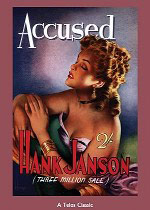- Welcome
- Noir Zine
- Allan Guthrie
- Books
"...those who enjoy the darker side of the genre are in for some serious thrills with this..."
Laura Wilson, The Guardian

Published in the UK by Polygon (March 19th, '09) and in the US by Houghton Mifflin Harcourt (Nov '09).
Hank Janson's Accused
Reviewed by Joseph M. Faria
 "Welcome to Henry Farrin’s nightmare" is how Mr. Steve Holland ends his introduction to the novel Accused by Hank Janson (a.k.a. Steven Francis) in the Telos edition, published in 2004. The novel is considered one of his best, and after reading all of the Hank Janson novels released by Telos so far, I enthusiastically agree. It is classic noir writing in its finest tradition. But there’s a caveat here that a potential reader should not ignore. None of the other Hank Janson novels (of those released so far) will match Accused for its psychological and physical terror.
"Welcome to Henry Farrin’s nightmare" is how Mr. Steve Holland ends his introduction to the novel Accused by Hank Janson (a.k.a. Steven Francis) in the Telos edition, published in 2004. The novel is considered one of his best, and after reading all of the Hank Janson novels released by Telos so far, I enthusiastically agree. It is classic noir writing in its finest tradition. But there’s a caveat here that a potential reader should not ignore. None of the other Hank Janson novels (of those released so far) will match Accused for its psychological and physical terror.
The story begins with Henry Farrin, a twenty-year-old boy, locked up in a cell, tortured by the cops for murdering a man named Freidman and his young wife at a diner in the middle of nowhere.
As the story unfolds we are presented with Farrin’s story of how he was taken in by Friedman, the owner of the diner, a beastly, penny-pinching domineering husband who abuses his wife, and runs his diner like a boot camp. The wife (we never know her name) is much younger, shy, and an obedient slave who is chained to her sadistic husband "Till death do us part."
Freidman guesses the young Farrin is running from something, perhaps the cops, and offers him a job and a safe haven as long as the boy does as he is told. Right from the start, Farrin is forced to sleep on a wooden floor in the middle of the diner across from their bedroom. But he can’t sleep. It takes him hours to fall asleep. "She was moaning. Giving little moans, punctuated with sharp gasps of pain. The moans went on forever, and I couldn’t sleep while they continued." Farrin’s angst at the plight of Freidman’s wife is first filled with outrage and pity, but then as the story progresses, his feelings have changed and he becomes possessed by an overwhelming desire to have sex with her and rescue the young woman from her deranged, sadistic husband.
Here begins "Henry Farrin’s nightmare", filled with coveted lust, physical torment, and deadly revelations that spiral out of control until death is the last arbitrator of freedom.
Accused stands in this reader’s noir hungry opinion as a good example of what noir fiction speaks to: a man swept up by events not of his choosing, but none the less, he is there, participating, a witness to a wrong that he can right, but fate, indecisiveness, and a moral, tragic weakness renders him powerless and he becomes the accused, the one "left holding the bag".
The style of Accused is a relentless assault on your senses. The sexual tension and its aftermath has the mark of Cain stamped all over it, but who better to aspire to than a master of the genre. Yes, the writing in Accused is overwrought with adverbs and adjectives, and the grammar police would drool over its content, but what is essential here is the STORY, and it’s a damn good one. Well worth the price of admission.
*Accused was condemned as "obscene" in England, in 1954.
###
Copyright © 2006 Joseph M. Faria
Read an extract from Joseph's novel, Where Dead Angels Sing
JOSEPH M. FARIA was born on the island of Sao Miguel, in the Azores. He studied Creative Writing at Roger Williams University. His first book of short stories, From A Distance, was published in the Azores in June 1998 by Nova Grafica, Lda., and a book of poetry, The Way Home, was published in October 2003 by Lit Pot Press, CA. His work has been published in numerous venues, print and on-line. He is also the Contributing Editor of NEO, a literary print journal published in Europe. He lives in Warren, RI.
Contact Joseph
